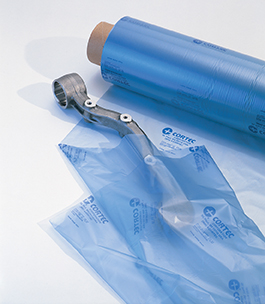Cortec Anti-Corrosion Film Now with High Recycled Content
- Published: July 10, 2013
 ST. PAUL, MN | Cortec Corp. presents the latest advanced version of VpCI 126 Blue-patented, high technology films and bags, now containing even higher content of recycled resin that provide top quality multimetal corrosion protection.
ST. PAUL, MN | Cortec Corp. presents the latest advanced version of VpCI 126 Blue-patented, high technology films and bags, now containing even higher content of recycled resin that provide top quality multimetal corrosion protection.
As part of its green concept, Cortec laboratories formulated an environmentally improved version of VpCI 126 films manufactured using a state of the art reprocessing line. The recycled content includes internal scrap, which makes the whole regranulation process energy efficient. It greatly reduces waste, while the consistent quality of VpCI126 films and bags remains.
This new eco concept of films and bags containing high recycled content enables rational use of resources and energy savings while the product still maintains excellent chemical, mechanical, and corrosion inhibiting properties.
VpCI126 Blue combines the latest film technology with the most effective corrosion protection for all of the metal products. Sealing a product in this film reportedly protects metal parts from all types of corrosion including rust, tarnish, stains, white rust, and oxidation for up to 5 years.
It replaces hazardous conventional rust preventatives such as oils and desiccants. By using VpCI126 Blue, the customer gains a safe and economical solution considering that it also eliminates all the degreasing or coating removal required in the past. The product can be used immediately, it does not contain free amines, phosphates, or halogen-based materials, and is non-toxic.
Not only is this product manufactured utilizing the most advanced recycled resin, but the custom blends are available to give our customers the exact properties they need, whether it’s improved puncture resistance, tear strength, or other requirements.
Metal parts packaged in VpCI126 Blue receive continuous protection against salt, excessive humidity, condensation, moisture, aggressive industrial atmospheres, and dissimilar metal corrosion. The VpCI's vaporize and condense to metal surfaces in the enclosed package, reaching every area of the part, even hard-to-reach interior surfaces. This allows complete product protection during storage as well as during domestic and overseas shipments.
Films and bags made from recycled polyethylene have low CO2 footprint because of savings in energy, raw materials, and transportation costs.
A study of plastic waste bags in Europe by IFEU concluded: "Bags made from true PCR (Post Consumer Recyclate) have generally the smallest environmental impact profiles and can be considered the most "eco-friendly" materials for waste bags". The study considered bioplastics, virgin polyethylene, and recycled polyethylene. These conclusions can be reasonably extended to plastic packaging materials.
VpCI126 Blue received approval by the Federal Drug Administration for indirect food contact for use on food containers and food handling equipment and approval from a leading institute regarding the recycling and disposal of packaging materials containing Cortec proprietary chemistry.




